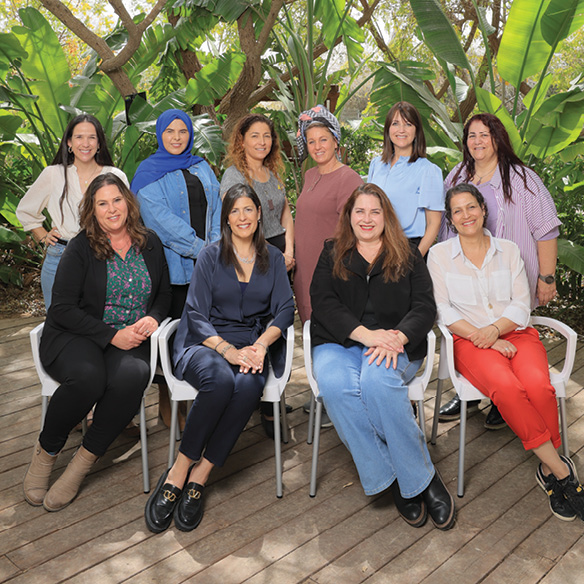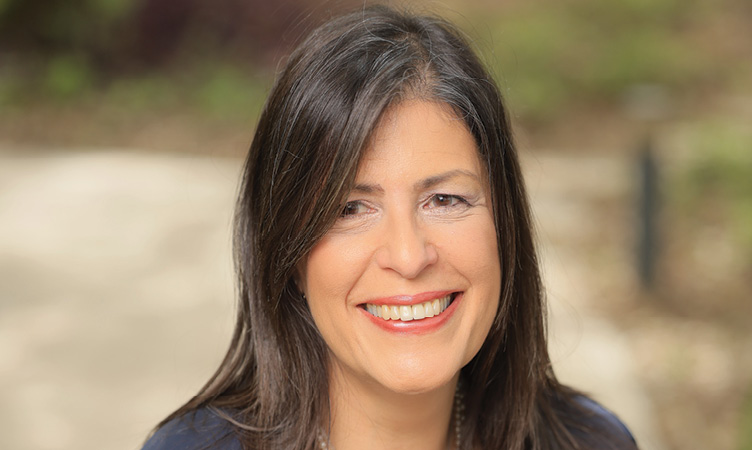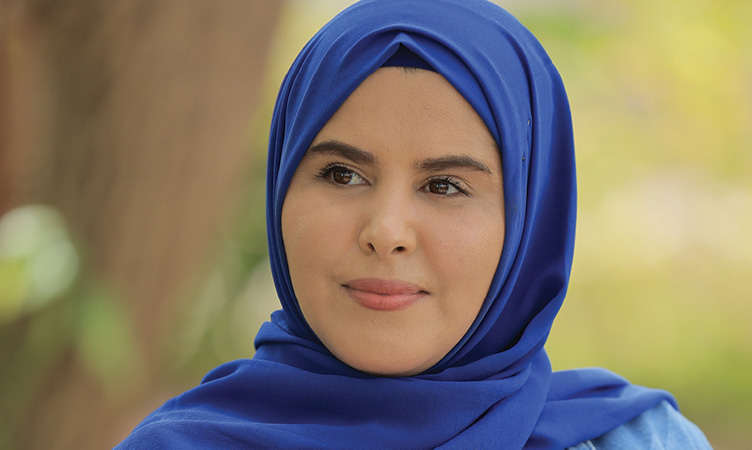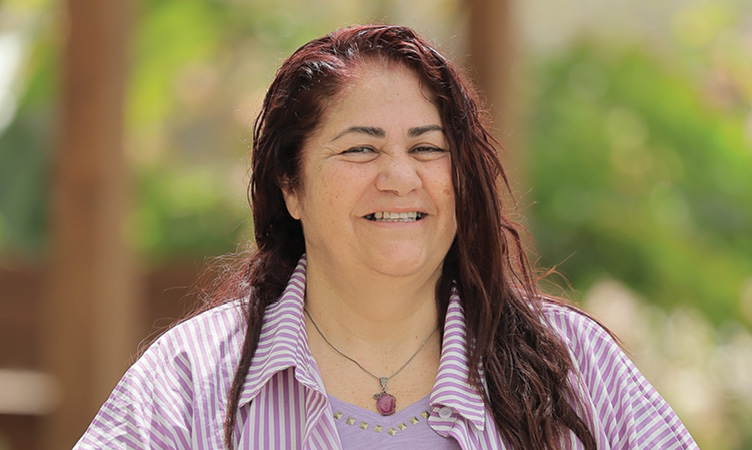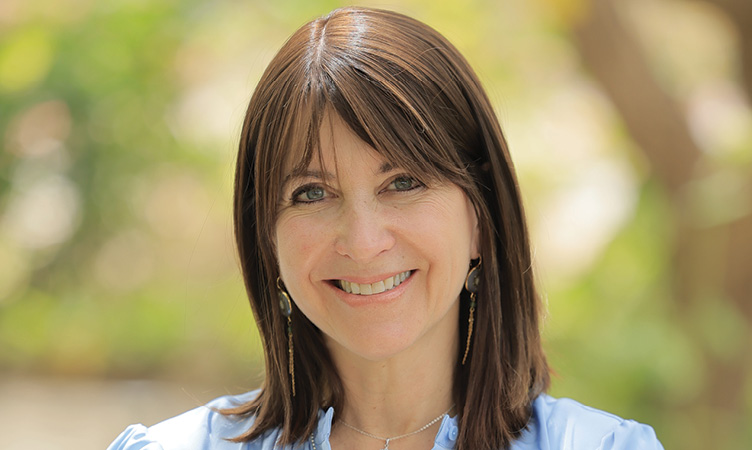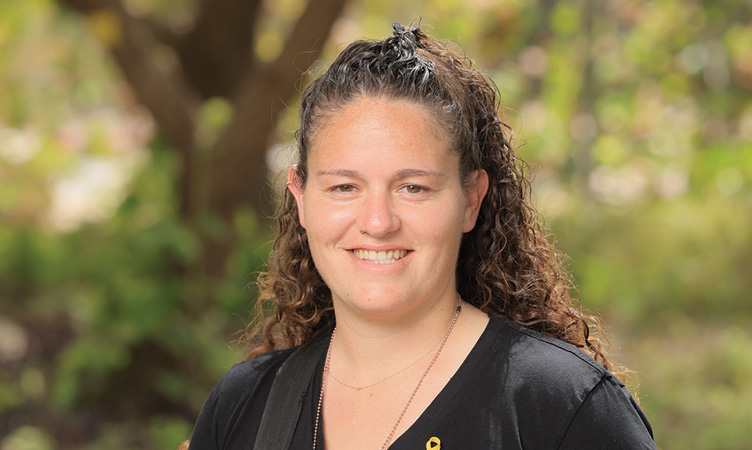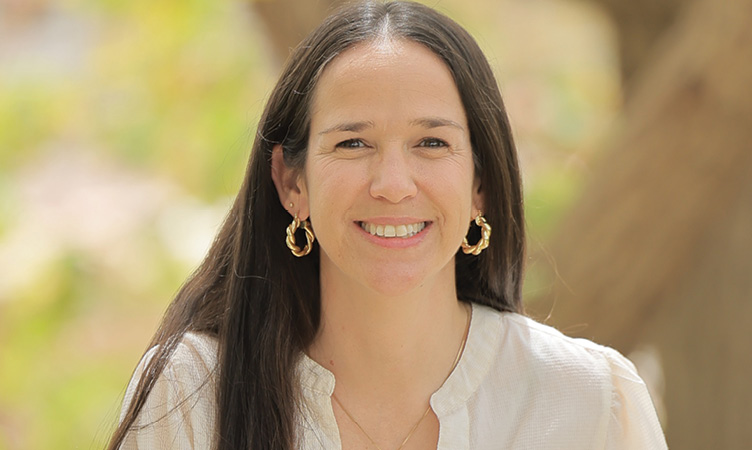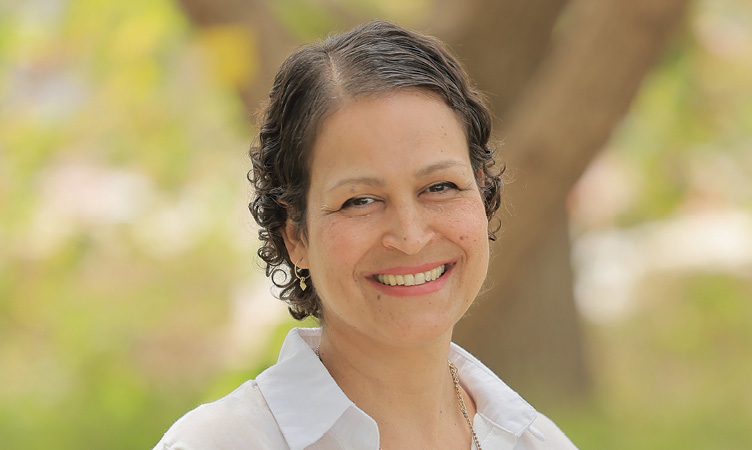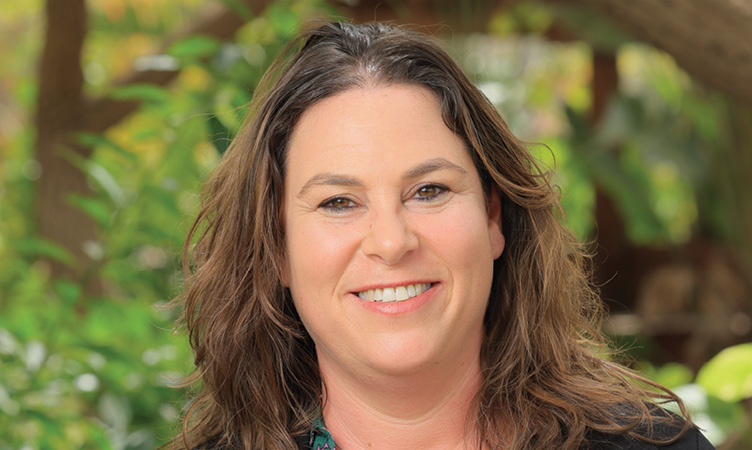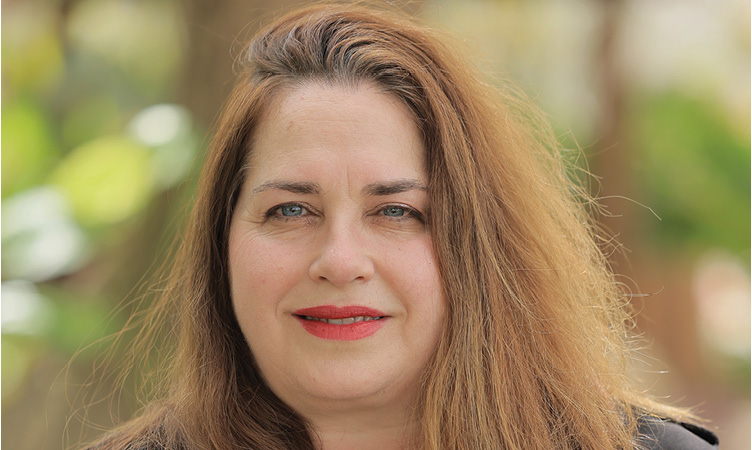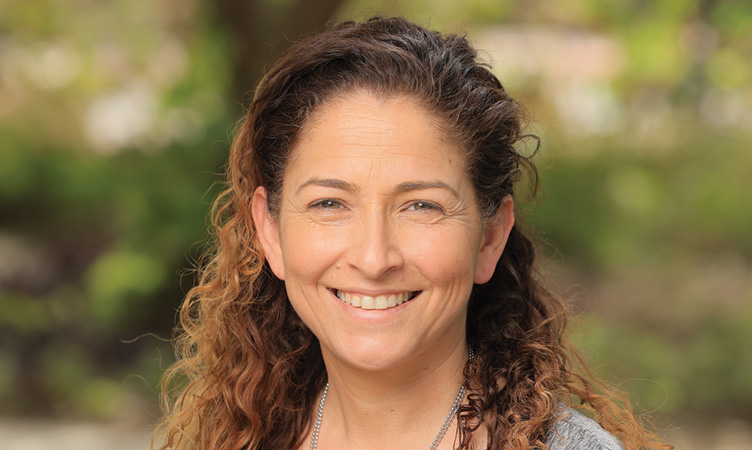TALIA TZOUR AVNER, Jewish National Fund-USA’s Chief of Staff Israel, jumped into action on October 7, along with the rest of her team. “We knew who to call and what to do because Jewish National Fund-USA has been developing and populating the Galil and the Negev for decades. The people who live there are our family.
“I remember that when we started to call around to the people in communities along the border with Gaza to see how we can help, some of them answered in whispers from their shelters. Thankfully we helped evacuate about 30,000 people and sent them to our partner communities that were waiting for them throughout the Negev – in Mitzpe Ramon, Arad, Yerucham, and the Arava. We quickly realized evacuation wasn’t enough; the host municipalities needed attention as well. For example, Mitzpe Ramon has a population of 5,300 people and they absorbed 3,700 people. Clearly they needed assistance.
“So we asked them what their needs were. From mattresses to hot meals to medical equipment, mental health services, toys and equipment for the children, vests and helmets, clothing, you name it! Within less than 24 hours of a request, Jewish National Fund-USA shipped the equipment or sent the money to answer those specific needs. Up until today I get emails and phone calls from mayors thanking us for being the only organization that was responsive to their needs.
“Now, we are focused on helping the evacuees move back home. Schools are a major factor in assisting families to return. So we are building and opening temporary schools in the Regional Councils of Eshkol and Shaar Hanegev. We clean equipment, repair buildings, paint, and prepare the facilities. Hundreds of families, thousands of people, have already moved back because they can send their kids to school.
“We are there, both with our professionals and with our volunteer teams. Hundreds of people are coming to volunteer each month, rolling up their sleeves and working on the ground to bring these people back home. As an Israeli and as someone who works for Jewish National Fund-USA, I’ve never been prouder.”
JAMILA ABU QAF, a mother of two, runs the school program at the Jewish National Fund-USA supported Wadi Attir Bedouin Sustainability Project. Wadi Attir is a unique cooperative that provides economic and educational opportunities to the Negev’s Bedouin population and brings together Jewish and Muslim Israelis to collaborate for sustainability.
“I think we need this opportunity to join hands and fill the gaps so that we can be better prepared for the next time,” she said. “In that sense Wadi Attir is an island of connection amidst this kind of insanity. There is no Arab or Jew or Bedouin here in Wadi Attir. We are all just people. And since October 7, we have initiated days of interaction between Arabs and Jews. We want to live in peace and be open and raise our children without fear. Jamila concluded: “I’m always optimistic and I see in this crisis an opportunity. If we’re not optimistic it’s impossible to survive here.”
It’s a 30-minute drive from Um Batin to Ofakim, where 53 people were killed on October 7. PAULI BILLYA is a longtime youth worker in Ofakim who heads the Dor L’Dor hub that’s part of Jewish National Fund-affiliate’s MAKOM, a movement of 18,000 volunteers who are changing the social fabric of Israel by living in and enriching less advantaged communities largely in Israel’s north and south.
On October 7, Pauli’s son, Shai, and his friends fled from the Nova Festival and headed toward Ofakim. When they stopped at Kibbutz Reim to seek shelter, terrorists began shooting at their car. “Someone there told them not to continue to Ofakim,” she recalled. “Shai said, ‘But my mom is waiting for us,’ and the man replied, ‘Your mom will thank you so much for not reaching Ofakim.’
“Later that week we opened the shelters. The municipality sent all kinds of activities for the kids to do. The community association started sending food boxes to older people and anyone in need. Then we started distribution of food to the elderly and to people who had not left the house for weeks. Jewish National Fund-USA was responsible for all the food deliveries.
“We started sending food parcels to those families who had lost people in Ofakim. People were sitting shiva, so they couldn’t get out. I and a few other women prepared the food at the center and the teenagers started to help with deliveries. The community mobilized, everyone has done something.”
MICHAL SHILOAH GALNOOR, founder and director of the non-profit Western Galilee Now (WGN) small business consortium, a Jewish National Fund-USA partner, shoulders different worries: the fate of the more than 100 small businesses under the WGN umbrella. “During normal times, we are involved with planning and publicizing local initiatives, workshops, culinary events, wine tours, guided tours, themed weekends, and custom tours for both Israeli and foreign visitors,” she explained.
“Today, almost everyone behind those activities (including me) has been displaced from their homes for months and had their businesses disrupted. So, with the support of Jewish National Fund-USA, WGN has pivoted to do whatever it can to support those affected. The group now holds workshops on how to find new target markets and how to market in war time. In addition, staff and volunteers immediately started preparing and distributing support packages for soldiers and evacuees. The contents were products from small businesses run by women in the north and the Negev.
“Because of the publicity from Jewish National Fund-USA, people from all over the world buy the boxes. We sold thousands of packages in the Mitzvah Marketplace, (jnf.org/supportpackages) and the income has crossed the 1 million-shekel mark and continues to grow. Tomorrow will be a new day. This is how we grow up here. We have the responsibility to help others, to pick them up. For us, having a purpose is very meaningful.”
Similar sentiments are expressed by MICHAL UZIYAHU, Jewish National Fund-USA’s Development Officer who experienced October 7 at home, four miles from the Gaza border.
“Right now, it’s about looking forward to tomorrow, believing in tomorrow, and bringing tomorrow. None of us, even the Jews in the Diaspora, realized that after years and years of trying to build bridges—antisemitism is alive and kicking. I feel like in many ways we lost historical perspective. I took Israel for granted. My generation took it for granted that I can go to sleep and wake up in a safe country.
“It’s going to be tough for a while, not only here, but up north, all over Israel, and for Jewish people around the world. How will it help to feel sorry for myself and to feel like a victim? I will never let anyone treat me as a victim. I’m not a victim. We will never be like before October 7, but we will be better and stronger.”
Michal recounts her experience on October 7 in a voice filled with emotion. “Hour after hour we were in the shelters and at one point I left my house and joined a group of community members who opened the emergency headquarters. In the evening, we realized that it’s all on us, nobody was coming. Luckily, as a staff person of Jewish National Fund-USA, we already had an evacuation plan that we never imagined would be implemented on this scale.
“I had already received the number of available rooms in different locations, so we started to evacuate our own people on Sunday morning. First, people with special needs and the youngest kids and elderly people, and after that, most of the community. In the first few weeks I was not functioning as chief development officer; I was just part of the emergency team of my community. I was mostly sharing the personal experience on Zoom every day with Jewish National Fund-USA, trying to give some insights, but we were mourning and grieving.
“Jewish National Fund-USA started immediately writing a ‘rebuild’ program, and I felt like they gave me the time to heal step by step. One of the things that we always say in the emergency field is that to be resilient you need to remember that you are not alone, and you need to remember that you are a capable person. Jewish National Fund-USA reminded us we are not alone. It meant a lot to us.
At 27, INBAL KASPI is the youngest woman in the group. She is a teacher at an agricultural farm in Sderot who previously served in the IDF and does her reserve duty as a member of the emergency security team of Kibbutz Magen, where she was born. On October 7, Inbal and her fellow team members used equipment donated by Jewish National Fund-USA to fight off dozens of terrorists who invaded their kibbutz, arriving in waves for nine hours before the IDF arrived. One member of the kibbutz, Ofir Yaron, was taken hostage.
“On October 7 we saw how important women are to the entire security and defense establishment and how much power we have,” she said. “In the end, it’s all about the people who are around you, how you are united and how you act. That’s the power that you generate.”
“We have each other’s back. That’s helped me cope,” said DOREET FREEDMAN, a resident of Efrat and VP of Strategic Partnerships and Development for Nefesh B’Nefesh, a Jewish National Fund-USA partner that promotes and facilitates aliya (immigration to Israel) from North America. Two of Doreet’s sons and a son-in-law “ran out the door to Gaza” on October 7.
“As a mother of sons who were officers on the front lines in this war, I could think of nothing else day or night. I was consumed by concern for their safety. Yet I witnessed in them a remarkable sense of purpose and commitment to something far greater than themselves. Like my own kids, 5,000 lone soldiers (soldiers in the IDF with no family in Israel) did not hesitate for one moment and courageously stood to defend Israel in this fight for our survival.
I couldn’t shake the thought of mothers worldwide, like myself, anxiously yearning to hug their soldier children. Thus, ‘Operation Hug’ was born—a very special initiative providing airline tickets so one parent of a lone soldier serving in active combat units could come to Israel and give their child a hug. Being part of this initiative was emotional and deeply meaningful. Our children have emerged as leaders and are cognizant that having the ability to defend our own Jewish State is as much a responsibility as it is a privilege. It reaffirmed for me that not all heroes wear capes – rather our heroes wear IDF uniforms.”
The Central Arava region is home to TANIA PONS ALLON, Director of the Kasser Joint Institute for Food, Water and Energy Security, a joint project of Jewish National Fund-USA, the University of Arizona, and the Arava Regional Council.
In addition to her own work, Tania helps out on her family’s farm. “We have a lot of greenhouses and October is the beginning of the season. You have to trim the plants and wrap them on strings, and if you don’t do that on time, it all falls and rots,” she explained. “So, for three weeks after October 7, I started every day by working on the farm helping my husband as we lost all our help.” And then there was the addition of evacuees.
“Normally 150 families live here on the moshav. An additional 250 people joined us, so it was a lot. Because I’ve been working with Jewish National Fund-USA, I took charge of securing equipment and organizing activities to help the evacuees feel at home, in addition to my farmwork and my regular work with the Kasser Joint Institute.
“Since October 7 I learned that the mind is magnificent, and we can jump from grief to anger to happiness in such a short time. It’s the Jewish Israeli mentality. I think that when you live through so much trauma for generations there is a genetic component that enables you to move on and grow. Each time when they try to eliminate us, we come together, we rise, and I think this is one of those times.”
NOA ZER, Resource Development Director for the Central Arava, was also part of the massive effort to absorb thousands of people forced to flee from their homes on October 7. “What was amazing was that with all the hectic balagan going on, I didn’t even have time to pick up the phone. I got a phone call from Jewish National Fund-USA asking, ‘What do you guys need?’” she recalled.
“I told them, food. These people need three meals a day, at least one hot meal. Twenty-four hours later the funds were transferred to our bank account. Two days later, again, what do you need? I said, we need to form an educational framework for the kids because they need some sort of routine, and the parents need some time to themselves.
“The interesting thing is that because we have such a long partnership and a lot of trust between our Regional Council and Jewish National Fund-USA, they understood that we know exactly what we need and how to execute it. So even if other organizations were saying, we have a plan for you, we want you to do this or that, Jewish National Fund-USA understood that we know our community and how to do what needs to be done. If they hear that the program is viable and it makes sense, you get a green light. So, it was food, it was an educational framework, psychological assistance, and everything else that we needed.
“I’m very proud and feel fortunate to live in a community like the Arava. I always knew that the people were kind, and the people were courageous, and they were all about helping each other, but the way people opened their hearts – it was really amazing. I feel so blessed to be able to live in a community like this.
“As for the future, I hope that the Arava and the periphery of Israel will take a more prominent place on the national map. I hope that more people will realize that the future of Israel lies in the Negev. I hope that rural communities like ours will be appreciated and I hope that good people who are taking action will be more present in our daily life without a crisis.
“People taking care of each other, taking the lead, and rising to the occasion are what’s needed. I hope we will not just rely on politics but on the doers on the ground and organizations like Jewish National Fund-USA.
MAAYAN GADISH GROSS, from Moshav Ein Yahav, part of Noa Zer’s region, has since become the council’s coordinator for displaced people. “I don’t remember those early, crazy days,” she said. “My kids didn’t see me. For three days people just kept on coming. You have to understand that our area has a population of just 4,500 inhabitants. We had to add another 2,800 inhabitants in the space of three days.
“People took other families in, cooked and did laundry and gave them clothes because people came with nothing.
“The greatest realization was that at the end of the day, the Arava is a strong hinterland within this crazy and amazing country of ours.”
Talia Tzour Avner sums up the resolve that each of these women feel about creating a bright future for all Israelis. “Working for Jewish National Fund-USA and knowing that developing Israel—especially the Negev and the Galil—as well as helping to connect American Jewry to our land and the people of Israel is what keeps me strong.

